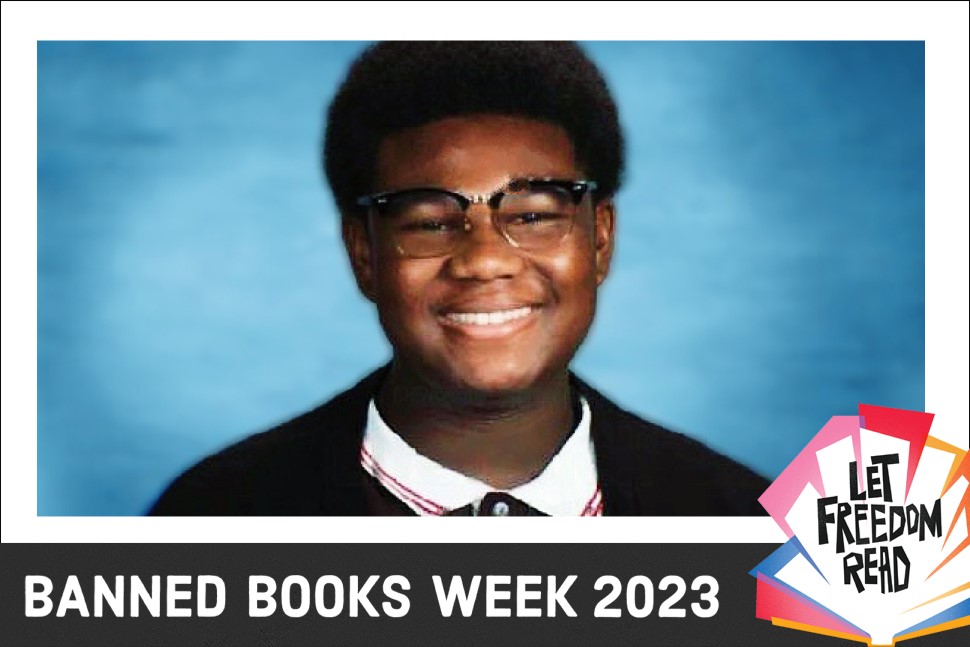Newsmaker: Da’Taeveyon Daniels

High school senior Da’Taeveyon Daniels has quickly become a passionate leader in advocating for students and intellectual freedom. The 16-year-old from Fort Worth, Texas, is the youngest member of the National Coalition Against Censorship’s Advisory Council, the partnership director for Students Engaged in Advancing Texas (SEAT), and the leader of Student Advocates for Speech (SAS) chapters at Euless (Tex.) Trinity High School and Harmony Science Academy, also in Euless. In these roles, he has written and spoken extensively about censorship’s impact on young people, and he has been recognized by the Texas House of Representatives for his efforts.
The 2023 Banned Books Week youth honorary chair spoke with American Libraries , the importance of expressing identity authentically, and what gives him hope in challenging times.
What does it mean to you to be chosen as the youth honorary chair of Banned Books Week, especially as the US is facing record-breaking book challenges?
This position is an opportunity for me to bring to the table a different viewpoint and perspective. I am a Black, queer man, and those intersectionalities don’t always go hand in hand, especially in today’s society. I want to represent students who look like me, sound like me, talk like me, and act like me, and show them that this type of work is possible. This is a concerted effort against marginalized communities to ban books and enforce censorship. To fight that, we have to unite together—even the young people.
Texas has been a hotspot for book challenges. Why do you think that is?
Each state has its own political landscape. This battle, particularly in this war against identity, stems from fear. We are the most openly queer generation there is. We’re happy in our truths, our own identities, and our own skins—and there’s been a multifaceted war on identity and truth.
I think it also stems from control: They want to have so much control over the younger generation, and we’re not going to allow them to continue to perpetuate negative cycles of control and abuse. Libraries are a sanctuary and a safe space for exploring identity, so, banning libraries and books would in turn ban people’s ability to explore their own identities. We’re not getting with that program anytime soon.
How did you get involved in the fight against book banning?
About a year ago was my awakening to this fight. I started out as the student advocate for the National Coalition Against Censorship, where I lead two clubs here in Texas. We focus on fighting book bans, protesting, getting books in the hands of young people, and getting out the message that we have to be represented in the books that we read.
Since then, I’ve been expanding my advocacy work into the legislative side with SEAT. My work there started with developing strategies to combat Texas House Bill 900 and showing people this bill will harm young people in Texas and set a precedent for other states to keep passing bills and legislation and policy like this. And young people, we were right about that.
How can you reach teens who may not be able to commit as fully as you have?
When I started out with SAS, it was about bribing kids with pizza and bringing them into the club meetings. But in doing that, it’s also about connecting with them and showing them what’s happening in our community and that we’re not necessarily being represented properly when it comes to what we have available for us to read in our schools. It’s about being personable, likeable, and connecting with them to show the threat that we’re facing.
What are some practical things teens and other young people can do?
I have a book recommendation, actually: Mutual Aid by Dean Spade. That book can show you the way of being able to support your fellow young people who are actively fighting, and joining the movement when you can. We need a chorus of voices, and we need you to be unapologetically you. They’re trying to ban our identities and our perspectives and our beliefs. By being unapologetically you, you’re telling them, “You can’t bend me as a human, and you can’t stop who I am.”
What role have libraries played in your life? And what impact can they leave on other young people?
Libraries allowed me to search for validity within my own identity. It was a safe space for me, and that’s the situation for a lot of young people throughout Texas and the nation. Libraries are a place where we can go to explore ourselves and be our true selves by immersing ourselves in literature.
These are difficult times, but what gives you hope for the future?
Young people! I’ve been doing this work for a little over a year now. I’ve seen the capacity that we have as young people fighting this fight and so many other fights. We’ve flourished in our efforts to create a better future not only for ourselves but for future generations.
Banned Books Week takes place Oct. 1–7.
Source of Article